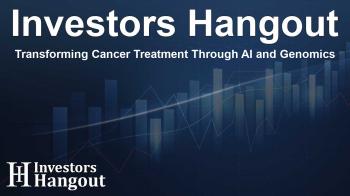Transforming Cancer Treatment Through AI and Genomics

Revolutionizing Cancer Treatment with Predictive Oncology
Predictive Oncology Inc. (NASDAQ: POAI) is on a mission to transform how cancer treatments are discovered and developed. The company harnesses the potential of artificial intelligence (AI) and machine learning to expedite the early stages of drug discovery, utilizing a biobank of over 150,000 diverse live cell tumor samples and associated drug response data. This innovative approach is not just a technological advancement; it signifies a paradigm shift in precision medicine.
Industry Trends: Data-Driven Drug Discovery
Recently, the pharmaceutical landscape witnessed a significant move when Regeneron Pharmaceuticals announced its acquisition of 23andMe for $256 million. This strategic acquisition underscores the rising importance of data in drug discovery, particularly genomic data. 23andMe is renowned for possessing one of the largest genomic databases worldwide, with a wealth of longitudinal health data that aids in understanding disease mechanisms, treatment effectiveness, and patient stratification.
The Value of Real-World Data
The advantage of having access to such a robust dataset cannot be overstated. The ability to track health outcomes over time empowers researchers and developers to glean valuable insights that can drive innovations in therapeutic development. As demonstrated by a previous $300 million partnership between 23andMe and GlaxoSmithKline (GSK), the potential applications of this data in informing drug discovery and enhancing clinical efficacy are profound.
How Predictive Oncology Stands Out
At the forefront of utilizing genomic and health data is Predictive Oncology, which recently achieved a milestone in AI-driven cancer drug discovery. According to Raymond Vennare, Chairman and CEO of Predictive Oncology, the company has successfully developed predictive tumor response models using compounds sourced from the Natural Products Discovery Core at the University of Michigan. These models target several common cancer types, including breast, colon, and ovarian cancers.
Innovation through Artificial Intelligence
What distinguishes this development is the absence of prior response data for these compounds, illustrating how AI can not only enhance but also lead in early-stage drug discovery. The proprietary machine learning platform employed by Predictive Oncology can accurately model tumor responses based on insights obtained from its extensive biobank. This initiative is part of a larger shift within the pharmaceutical industry, where AI and empirical validation converge to boost the Probability of Technical Success (PTS) in drug development.
Accelerated Drug Development Through Collaboration
By integrating real-world drug response data with advanced machine learning techniques, Predictive Oncology accelerates the drug discovery process. The company’s approach reduces risks in downstream drug development, offering partners an opportunity to expedite timelines and maximize returns on investment. This unique combination facilitates an informed selection of drug-tumor type combinations prior to extensive testing.
The Future of Precision Medicine
Predictive Oncology embodies the shift in the life sciences sector towards the integration of genomics and advanced analytics. As the industry evolves, the incorporation of these technologies will become increasingly vital in shaping the future of personalized medicine. This strategic positioning ensures that Predictive Oncology remains at the cutting edge of innovation in oncology drug discovery.
About Predictive Oncology
Predictive Oncology is dedicated to advancing the use of AI and machine learning in drug development, aiming to enhance treatment options for cancer patients globally. The company's AI platform, known as PEDAL, boasts a remarkable 92% accuracy in predicting tumor responses to drug compounds. This capability supports a well-informed selection process for subsequent in-vitro testing, complemented by a biobank that substantially bolsters industry collaboration in drug discovery.
The company operates out of Pittsburgh, PA, and remains committed to shaping the future of cancer treatment through scientific ingenuity.
Frequently Asked Questions
What is Predictive Oncology Inc.?
Predictive Oncology Inc. is a biotechnology company focused on using AI and machine learning for drug discovery and development specifically in oncology.
How does AI enhance drug discovery?
AI models can swiftly analyze vast datasets to predict how various tumor types will respond to treatments, allowing for quicker and more effective drug development.
What recent acquisition impacted the biopharmaceutical industry?
Regeneron Pharmaceuticals' acquisition of 23andMe for $256 million has highlighted the growing importance of using genomic data in drug discovery.
What are the main advantages of Predictive Oncology's approach?
The integration of real-world data and AI allows for sped-up drug discovery, reduced development risks, and maximized returns on investments for partners.
Where is Predictive Oncology headquartered?
Predictive Oncology is headquartered in Pittsburgh, Pennsylvania, and is leading in innovative cancer treatment solutions.
About The Author
Contact Dominic Sanders privately here. Or send an email with ATTN: Dominic Sanders as the subject to contact@investorshangout.com.
About Investors Hangout
Investors Hangout is a leading online stock forum for financial discussion and learning, offering a wide range of free tools and resources. It draws in traders of all levels, who exchange market knowledge, investigate trading tactics, and keep an eye on industry developments in real time. Featuring financial articles, stock message boards, quotes, charts, company profiles, and live news updates. Through cooperative learning and a wealth of informational resources, it helps users from novices creating their first portfolios to experts honing their techniques. Join Investors Hangout today: https://investorshangout.com/
The content of this article is based on factual, publicly available information and does not represent legal, financial, or investment advice. Investors Hangout does not offer financial advice, and the author is not a licensed financial advisor. Consult a qualified advisor before making any financial or investment decisions based on this article. This article should not be considered advice to purchase, sell, or hold any securities or other investments. If any of the material provided here is inaccurate, please contact us for corrections.

